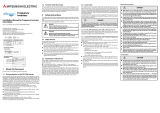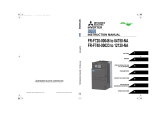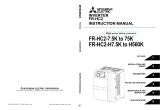
2 - 1
2. Compliance to the EMC Directive of the inverter
A general-purpose inverter is not designed to operate by itself, but is a component
designed to be installed in a control enclosure in combination with other devices to
operate a machine or equipment.
Many organizations including the European Committee of Manufacturers of Electrical
Machines and Power Electronics (CEMEP) interpreted that components were not
directly subject to the EMC Directive under the EMC Directive (89/336/EEC).
However, under the amended EMC Directive (2004/108/EC), components are
required to conform with the EMC Directive.
Mitsubishi performs assessment on major models for the conformity with the EMC
Directive under the conditions described in this guideline and declares that the
models conform with the EMC Directive (2004/108/EC). Mitsubishi cannot, however,
declare the conformity of an inverter in your operating conditions. EMC changes by
the enclosure structure that contains the inverter, compatibility with other embedded
electronic devices, wiring, and placement. For this reason, ensure that the entire
machine or the system conforms with the EMC Directive.
Installation methods and EMC measure options are recommended in this guideline
so that the machine or the system that is containing an inverter can conform with the
EMC Directive easier. (To comply with the EMC Directive in the environment
described in Chapter 5, the installation method and the EMC measure option, which
are explained in Chapter 5, must be used.)
<Supplementary information>
●EC Directives and CE marking
The EC Directives are issued by the Council of the European Union to standardize
different national regulations of the EU Member States and to facilitate free movement
of the equipment whose safety is ensured. CE marking (affixation of the CE marking) is
required to distribute the products subject to the EC Directives in the EU territory.
When the manufacturer or his authorized representative does not comply with these
requirements, (1) a fine, (2) withdrawal from the market, and (3) prohibition of the free
movement of the product are imposed.
●
EMC Directive (89/336/EEC)
The EMC Directive is one of the EC Directives. The EMC Directive requires products not to
generate excessive electromagnetic disturbance to outside (emission or electromagnetic
interference) and to have immunity to the external electromagnetic disturbance from outside
(immunity or electromagnetic susceptibility). The applicable products are required to bear
CE marking.
Affixation of the CE marking on the products, which conform with the EMC Directive, has
been required since January 1, 1996. It was repealed on July 20, 2007, and it will be
prohibited to market a product in compliant with the provisions of this EMC Directive after
July 20, 2009.























